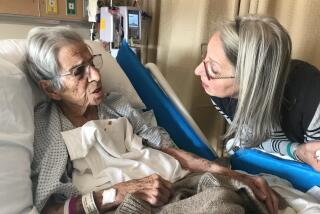U.S. Nurses Not Alone in Their Frustration
- Share via
For much of the last decade, nurses in U.S. hospitals have decried what they called a decline in the quality of patient care, often blaming the influence of HMOs. Now a major new study has found that nurses in Canada and Europe, which have forms of national health plans, share the same frustrations.
The nurses complained that hospitals are understaffed, that they are spending too little time with patients and that patients are being sent home too early.
“About half of nurses reported a decline in the quality of patient care provided in their hospital within the last year. And no more than a third of them judged the care provided as excellent,” said Linda Aiken, a University of Pennsylvania researcher and the study’s lead author.
The survey of 43,329 registered nurses in the United States, Canada, England, Germany and Scotland is the largest study of its kind to ask nurses about the quality of patient care in hospitals and about their job satisfaction.
The study, which appears in the May-June issue of the policy journal Health Affairs, found that one of every three U.S. nurses under age 30 is planning to leave his or her job in the coming year. In Great Britain, more than half of the under-30 nurses planned to quit their jobs.
Nurses are already in short supply in many parts of the United States, and experts are predicting a shortfall of between 400,000 and 600,000 nurses by 2010. The average age of U.S. nurses ranges from 42 to 45 years throughout the country.
The international team of researchers, led by Aiken, a professor of nursing and sociology at the University of Pennsylvania, predicted worse nursing shortages unless corrective actions are taken.
What’s needed, the researchers said, is a different model of hospital management--one that makes hands-on patient care the top priority for nurses and makes sure other hospital workers help nurses focus on their essential duties. After all, Aiken said, the most unique service that hospitals provide to the sick and injured is nursing care.
The nurses reported that their working conditions have declined as hospitals try to hold down costs. And that was true whether for nurses working at U.S. hospitals, where private managed care companies have strongly influenced how services are delivered, or in Canada and Europe, which have nationalized health systems.
The nursing problems are exaggerated in the United States, where hospitals have undergone more extensive reorganization, more patients are uninsured and health plans have shortened patient stays, Aiken said. The U.S. sample was based on 13,471 acute-care nurses in Pennsylvania--half of all nurses in that state.
For example in the United States, 49.1% of nurses reported complaints about care from patients or families, compared with 43.4% in Canada and 32.6% in Germany, the only countries in the study for which those answers were available.
Aiken said the nurses’ opinions are crucial because “these are the people that have the most credibility in making this assessment. They’re closest to the patients all the time. They understand explicitly what’s going on in hospitals.”
A spokesman for the American Hospital Assn. agreed, saying those hospitals that have had success in restructuring delivery of nursing care have done so by giving front-line nurses a voice in how changes are made.
The study’s other findings included:
* Two-thirds of those surveyed said there were insufficient numbers of nurses in their hospitals to provide adequate quality of care to patients.
* Only about a third of nurses in the U.S. and Canada, countries with the shortest hospitals stays, felt confident that their patients could care for themselves after leaving the hospital.
* In four of the five countries, about 40% of nurses reported being dissatisfied with their current jobs. That contrasts with about 10% of all U.S. workers who express dissatisfaction with their jobs.
* More than half the nurses in the U.S. and Canada reported being verbally abused regularly.
Aiken said nurses are becoming objects of the hospital equivalent of road rage, as patients, families and other staff become increasingly frustrated. “Nurses happen to be the lightening rod for this anger and frustration,” she said. “This is a factor in their high burnout rate.”
The findings validate a recent staffing survey by the American Nurses Assn., which found that 75% of nurses believed the quality of nursing care around them has declined in the last two years, said Hope Hall, the group’s spokeswoman.
Current working conditions, such as mandatory 16- to 20-hour shifts, pose dangers to nurses and patients alike, she said.
“There’s not a quick fix,” Hall said.
“The answer is you’ve got to change the structure of how patient care is delivered,” said Rick Wade, a senior vice president for the Washington, D.C.-based American Hospital Assn. “Unfortunately, today, most hospitals are still pretty traditionally managed places.”
Patients, Wade said, expect a hospital to operate at peak ability around-the-clock and families expect that no expense will be spared.
One in every three U.S. hospitals is losing money, and in Pennsylvania, four out of five hospitals are in the red, Wade said. With medical inflation accelerating in recent years, employers, insurers and government payers are looking for ways to wring more savings from the system.
“We’re headed for a collision, and it’s all about resources,” he said.
Avoiding that collision can only come through cooperation among the nurses, doctors, hospitals, insurance companies and regulators, said Pamela Thompson, executive director of the American Organization of Nurse Executives, a unit of the American Hospital Assn.
Her organization is working to improve recruitment and to make sure nurses in management jobs have more say in how nurses’ jobs are organized.
“There are hospitals that have nurses with high satisfaction,” Thompson said. The key, she said, is to give nurses a voice in how we make decisions about patient care, being able to involve them in how units operate and giving them more autonomy in their practice.
Patricia Grady, director of the National Institute of Nursing Research at the National Institutes of Health, which funded the study, said the survey puts figures behind what up to now have been mostly anecdotal complaints from nurses.
“It gives us a great deal of information about some of the whys of the nursing shortage,” she said. “This study is important in pinpointing the extent of the problem, the gravity of it.”






